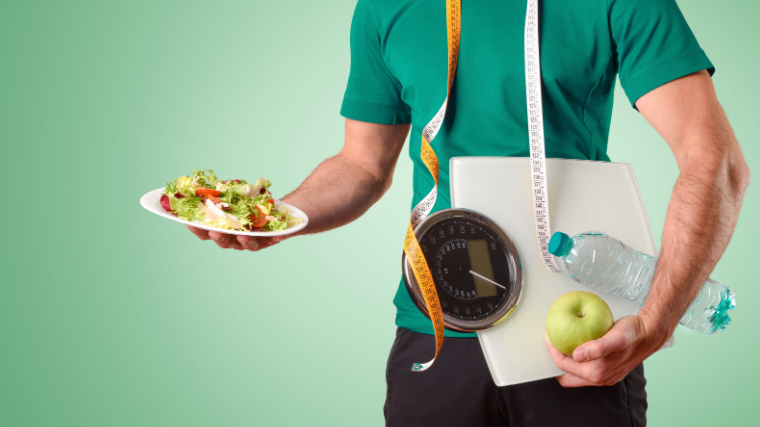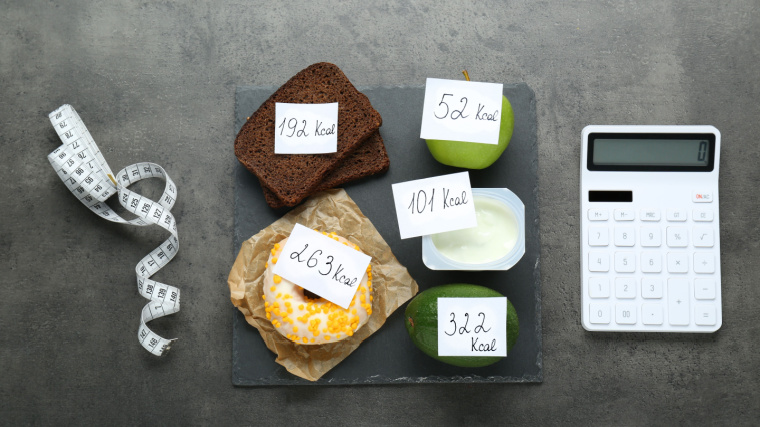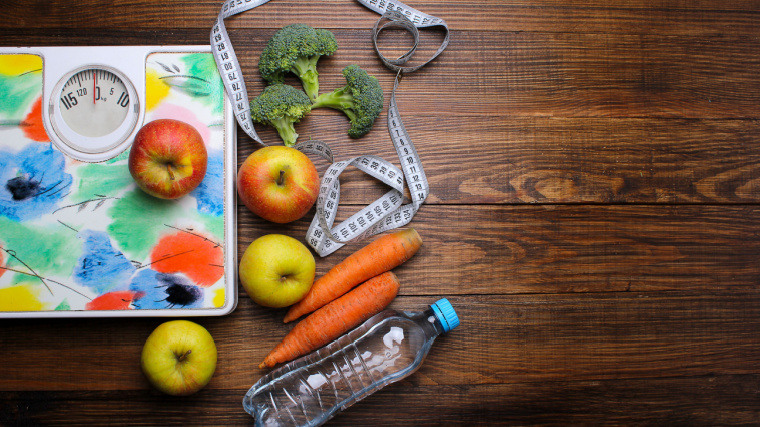What do a bride-to-be, a couple booking a long-overdue cruise, and a career powerlifter with an upcoming competition have in common? Oftentimes, they all want (or need) to lose weight — fast.
If you’re even vaguely familiar with health and fitness, you’ve probably heard the standard weight loss dogma more than enough times: Eat your vegetables, be more active, make sure you’re getting enough sleep each night, hit the weights, take this or that “magic” supplement, blah blah blah.

Don’t get it twisted: For the most part, that’s all sound advice (you can probably keep your wallet shut about the diet pills, though). Increasing your physical activity and monitoring your nutrition are sure-fire ways of changing the number you see on the scale … eventually.
But there are some situations where you need to change your body composition or body weight fast. While health is undeniably more of a marathon than a sprint, there are ways to kick things into high gear quickly. Here’s the science-based guidance behind rapid weight loss.
How Weight Loss Works
Whether you need to squeeze into a wedding dress or make the cut for a weight-class-specific sport, you need to understand the science behind how your body adjusts and manages its own weight.

[Read More: Best Fat Burners for Women]
First things first: The overwhelming scientific consensus regarding weight change is that slow and steady beats fast and aggressive almost every time, especially when it comes to sustainability in weight change. (1)(2)(3) That said, there are certain scenarios that legitimize a temporary, aggressive uptick in weight loss behaviors.
Understanding Energy Balance
Energy balance, or the ratio of calories consumed to calories expended within a given parameter of time (usually a calendar day), is the guiding principle behind weight loss. Excess calories are stored as fat (or used for other metabolic purposes, such as building muscle), so it follows that adjusting your influx of calories will affect weight change.
[Read More: Best Fat Burners]
Research indicates that one pound of body fat consists of roughly 3,500 calories. (4) So if you want to burn body fat, you need to expend an additional 3,500 calories worth of energy over time, on top of what you use every day to facilitate general bodily functions like physical activity, digestion, and so on.
The rule of thumb most commonly used is to divide that 3,500-calorie deficit across a seven-day week. Eat 500 fewer calories than you burn all seven days, and you should lose a pound of body fat. But your body’s weight is made up of more than just residual calories stored within your fat cells.
Digestion, Hydration, and Other Factors
Weight loss and fat loss aren’t necessarily the same thing: Losing fat by creating a caloric deficit will change the number you see on the scale, but your body weight also fluctuates on a daily basis all on its own, and sometimes quite dramatically.
Your eating behaviors can acutely, and of course chronically, affect your body weight. After all, the foods you consume and digest have weight, so you’ll be heavier after eating a large meal. Bowel movements, constipation, and other digestive health factors can impact your weight as well. (5)(6)(7)
[Read More: 8 Best Appetite Suppressants to Burn Fat, Boost Metabolism, and More]
There’s also hydration to consider. Your body stores water in more places than you’d think, and a well-hydrated person will weigh more than someone who is significantly dehydrated. Dropping “water weight” is a common tactic for rapid, temporary weight loss among athletes, particularly those who partake in combat sports like boxing or in strength sports like powerlifting or Olympic lifting.
How to Lose Weight Fast
If you want to lose weight quickly, you need to change both your eating habits and your physical activity levels. More moderate strategies like mindful or intuitive eating can create change over time, (8) but often won’t start working right away. To create drastic weight loss, you need to take drastic action — safely.
Step 1: Create a Caloric Deficit
A calorie deficit, also known as a negative energy balance, is all but mandatory if you want to create weight loss that lasts for more than a day or two. In essence, this simply means eating less, but you need to know exactly how much less in the first place.
To get there, you must arrive at a general marker of how much energy you burn every day through your normal habits; that’s your caloric maintenance level. This value can vary tremendously based on how you build your healthy habits, lifestyle, genetic factors like metabolism, and more. (9)(10)

[Read More: Best Supplements for Weight Loss]
Luckily, a bit of math can accomplish a lot of the legwork for you. Plug some simple data into BarBend’s science-based calorie calculator and it’ll tell you roughly where to begin:
Once you have an idea of how many calories you need to maintain your weight, subtract 500 to 1,000 calories from that to identify your target deficit. A 1,000-calorie deficit (or higher, even) is considered aggressive (11)(12) and may come with side effects like muscle loss, but should lead to faster weight loss if you play it smart.
Calorie Calculator
In short: Figure out your caloric maintenance level and subtract a number of calories each day to create a deficit. The more calories you take away, the faster you’ll lose weight, but with greater risk involved.
Step 2: Get (More) Active
Once you’ve got your general nutrition plan squared away, you may want to incorporate a bit of extra physical activity into the mix to speed things up. Note that your caloric maintenance level considers the energy burned through exercise by default.
For instance, if you burn 2,500 calories on average and perform gym or home workouts thrice per week, you’d need to add a fourth workout into the mix to increase your energy expenditure beyond that 2,500.
[Read More: The 10 Best Supplements for Weight Loss]
However, rapid weight loss protocols also negatively impact performance. (13) So, if you’re eating a scant amount of calories already to create your deficit, you may not want to throw yourself to the wolves in the gym with too many high-intensity workouts. Increasing your daily step count through leisure walks or ramping up how much strength training you do (within reason) are smart options here.
In short: Consider adding extra exercise into your routine to deepen your caloric deficit, but be mindful of the type and intensity of your exercise habits if you’re consuming a limited number of calories.
Step 3: Drop Water Weight if Necessary
Body fat (or muscle) isn’t the only thing you can shed if you want to change your scale weight. Water weight cuts are commonplace in sports as a means of getting an athlete into their competitive weight range and, in some cases, may be appropriate for your goals as well.
Carbohydrate intake also affects both your stored water levels and how much glycogen your muscles hold. You may have some success in your short-term weight loss endeavors by cutting carbs or even implementing a ketogenic diet.
Paradoxically, increasing the amount of water you consume (some data have used an additional 48 ounces per day as a benchmark) (14) can help you flush more stored water out of your system. Additionally, increasing how much you sweat through cardio training or sauna usage can cause you to drop several pounds quickly. (15)(16)

[Read More: How to Calculate Your Macronutrients for Weight Loss]
Understand, though, that intentional dehydration can pose serious health risks. (17)(18) If you’re opting for a regular sauna as a way of moving the needle on the scale, do so in a limited capacity and only after consulting with your doctor.
In short: Drinking significantly more water, severely restricting carbohydrates, and using a sauna or steam room will help you shed significant amounts of non-fat weight, but these practices come with potentially serious health risks.
Weight Loss Tips & Tricks
Don’t major in the minors when it comes to changing your body composition — a caloric deficit and more physical activity are going to account for most of your results, no matter how fast you need to lose weight.
That said, there are some tactics you can employ to both accelerate your results and ensure that you’re making progress in a way that won’t harm your health long-term:
- Increase your protein intake significantly. Protein (whether you get it from whole food or a whey protein powder) isn’t just essential for hypertrophy. Increasing how much protein you’re consuming has also been shown to help preserve muscle during caloric deficits, (19) and protein also has a high thermic effect — digesting and metabolizing it burns calories.
- Avoid supplementing with creatine if you currently are. Creatine is among the safest, most well-studied, and most effective over-the-counter supplements you can buy, but like any supplement, there are side effects of creatine. Some folks experience significant water retention while taking it, (20) so you may want to leave it out of your supplement regimen while trying to shed pounds quickly.
- Prioritize your sleep. High-quality rest helps you remain alert, attentive, and motivated during the day. But studies show that there are physiological benefits to getting extra shut-eye if you’re trying to lose weight, and some people who undergo a caloric deficit and don’t sleep enough are liable to lose more muscle than they otherwise would. (21)(22)
Very Low-Calorie Diets (VLCDs)
You may also consider briefly utilizing a high-protein but Very Low-Calorie Diet, or VLCD, for a period of time if you absolutely must lose a specific amount of weight quickly. VLCDs are the modern equivalent of what was once regarded as a “starvation diet.”
While your body doesn’t necessarily experience “starvation mode,” there are certainly consequences to severe nutritional restriction. However, some literature has acknowledged that VLCDs — consuming fewer than 1,000 calories per day — produce tremendously effective results. (23)

[Read More: How to Count Macros for Weight Loss, Muscle Gain, and Maintenance]
VLCDs typically last a few weeks at a time and mandate that the dieter consume little more than dietary protein, vegetables, and water. Any extreme dietary plan will come with side effects, though, and VLCDs may not be a wise choice for you. Discuss it thoroughly with your doctor ahead of time so you understand the risk factors involved.
Your Takeaways
Weight loss is possible for just about everyone, regardless of demographics or goals. That said, rapid weight loss can be a dangerous — but at times required — game to play.
- The major rules of weight loss don’t change just because you need to drop pounds quickly. A calorie deficit is still, for the most part, required.
- A steep caloric deficit coupled with high physical activity levels will account for most of your short-term weight loss.
- Other factors such as increasing your water intake, limiting carbs, or regular sauna usage can help you shed some scale weight as well.
- The more aggressive you are in your weight loss endeavors, the quicker you’ll get results.
- But rapid weight loss comes with its own inherent risk factors. Consult with a physician and monitor your health closely.
Remember, no matter your “why,” you should strive to maintain perspective when undergoing any significant bodily change. Losing weight fast is possible but can be dangerous in some cases. The risks may not outweigh the rewards.
References
- Koliaki C, Spinos T, Spinou Μ, Brinia ΜE, Mitsopoulou D, Katsilambros N. Defining the Optimal Dietary Approach for Safe, Effective and Sustainable Weight Loss in Overweight and Obese Adults. Healthcare (Basel). 2018 Jun 28;6(3):73. doi: 10.3390/healthcare6030073. PMID: 29958395; PMCID: PMC6163457.
- Kim JY. Optimal Diet Strategies for Weight Loss and Weight Loss Maintenance. J Obes Metab Syndr. 2021 Mar 30;30(1):20-31. doi: 10.7570/jomes20065. PMID: 33107442; PMCID: PMC8017325.
- Hall KD, Kahan S. Maintenance of Lost Weight and Long-Term Management of Obesity. Med Clin North Am. 2018 Jan;102(1):183-197. doi: 10.1016/j.mcna.2017.08.012. PMID: 29156185; PMCID: PMC5764193.
- Hall K. D. (2008). What is the required energy deficit per unit weight loss?. International journal of obesity (2005), 32(3), 573–576.
- Bocheng Xu, Jinping Cao, Jie Fu, Zhi Li, Mingliang Jin, Xinxia Wang, Yizhen Wang, The effects of nondigestible fermentable carbohydrates on adults with overweight or obesity: a meta-analysis of randomized controlled trials, Nutrition Reviews, Volume 80, Issue 2, February 2022, Pages 165–177
- Byrne, C. S., Chambers, E. S., Alhabeeb, H., Chhina, N., Morrison, D. J., Preston, T., Tedford, C., Fitzpatrick, J., Irani, C., Busza, A., Garcia-Perez, I., Fountana, S., Holmes, E., Goldstone, A. P., & Frost, G. S. (2016). Increased colonic propionate reduces anticipatory reward responses in the human striatum to high-energy foods. The American journal of clinical nutrition, 104(1), 5–14.
- Ojo, O.; Feng, Q.-Q.; Ojo, O.O.; Wang, X.-H. The Role of Dietary Fibre in Modulating Gut Microbiota Dysbiosis in Patients with Type 2 Diabetes: A Systematic Review and Meta-Analysis of Randomised Controlled Trials. Nutrients 2020, 12, 3239.
- Grider, H. S., Douglas, S. M., & Raynor, H. A. (2021). The Influence of Mindful Eating and/or Intuitive Eating Approaches on Dietary Intake: A Systematic Review. Journal of the Academy of Nutrition and Dietetics, 121(4), 709–727.e1.
- Ostendorf, D. M., Melanson, E. L., Caldwell, A. E., Creasy, S. A., Pan, Z., MacLean, P. S., Wyatt, H. R., Hill, J. O., & Catenacci, V. A. (2018). No consistent evidence of a disproportionately low resting energy expenditure in long-term successful weight-loss maintainers. The American journal of clinical nutrition, 108(4), 658–666.
- Safaei, M., Sundararajan, E. A., Driss, M., Boulila, W., & Shapi’i, A. (2021). A systematic literature review on obesity: Understanding the causes & consequences of obesity and reviewing various machine learning approaches used to predict obesity. Computers in biology and medicine, 136, 104754.
- Garthe, I., Raastad, T., Refsnes, P. E., Koivisto, A., & Sundgot-Borgen, J. (2011). Effect of two different weight-loss rates on body composition and strength and power-related performance in elite athletes. International journal of sport nutrition and exercise metabolism, 21(2), 97–104.
- Forbes G. B. (2000). Body fat content influences the body composition response to nutrition and exercise. Annals of the New York Academy of Sciences, 904, 359–365.
- Helms, E. R., Aragon, A. A., & Fitschen, P. J. (2014). Evidence-based recommendations for natural bodybuilding contest preparation: nutrition and supplementation. Journal of the International Society of Sports Nutrition, 11, 20.
- Dennis EA, Dengo AL, Comber DL, Flack KD, Savla J, Davy KP, Davy BM. Water consumption increases weight loss during a hypocaloric diet intervention in middle-aged and older adults. Obesity (Silver Spring). 2010 Feb;18(2):300-7. doi: 10.1038/oby.2009.235. Epub 2009 Aug 6. PMID: 19661958; PMCID: PMC2859815.
- Park, S., Alencar, M., Sassone, J. et al. Self-reported methods of weight cutting in professional mixed-martial artists: how much are they losing and who is advising them?. J Int Soc Sports Nutr 16, 52 (2019).
- Crighton B, Close GL, Morton JPAlarming weight cutting behaviours in mixed martial arts: a cause for concern and a call for actionBritish Journal of Sports Medicine 2016;50:446-447.
- Lakicevic, N., Paoli, A., Roklicer, R., Trivic, T., Korovljev, D., Ostojic, S. M., Proia, P., Bianco, A., & Drid, P. (2021). Effects of Rapid Weight Loss on Kidney Function in Combat Sport Athletes. Medicina (Kaunas, Lithuania), 57(6), 551.
- Lakicevic, N., Matthews, J. J., Artioli, G. G., Paoli, A., Roklicer, R., Trivic, T., Bianco, A., & Drid, P. (2022). Patterns of weight cycling in youth Olympic combat sports: a systematic review. Journal of eating disorders, 10(1), 75.
- Longland, T. M., Oikawa, S. Y., Mitchell, C. J., Devries, M. C., & Phillips, S. M. (2016). Higher compared with lower dietary protein during an energy deficit combined with intense exercise promotes greater lean mass gain and fat mass loss: a randomized trial. The American journal of clinical nutrition, 103(3), 738–746.
- Hall, M., & Trojian, T. H. (2013). Creatine supplementation. Current sports medicine reports, 12(4), 240–244.
- Thomson CA, Morrow KL, Flatt SW, Wertheim BC, Perfect MM, Ravia JJ, Sherwood NE, Karanja N, Rock CL. Relationship between sleep quality and quantity and weight loss in women participating in a weight-loss intervention trial. Obesity (Silver Spring). 2012 Jul;20(7):1419-25. doi: 10.1038/oby.2012.62. Epub 2012 Mar 8. PMID: 22402738; PMCID: PMC4861065.
- Papatriantafyllou, E.; Efthymiou, D.; Zoumbaneas, E.; Popescu, C.A.; Vassilopoulou, E. Sleep Deprivation: Effects on Weight Loss and Weight Loss Maintenance. Nutrients 2022, 14, 1549.
- Jeanne D. Blankenship, Bruce M. Wolfe. Chapter 9 – Dietary Management of Obesity, Editor(s): Henry Buchwald, George S.M. Cowan, Walter J. Pories, Surgical Management of Obesity, W.B. Saunders, 2007, Pages 67-72.
Featured Image: Davizro Photography / Shutterstock